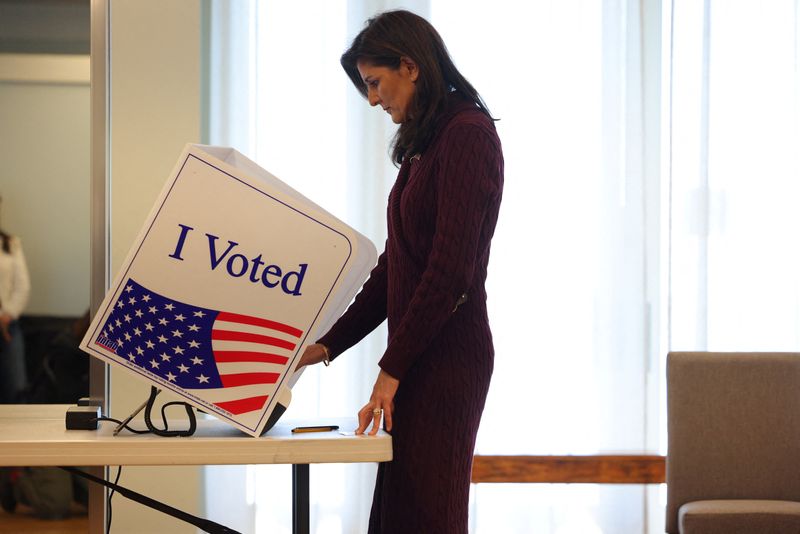(Reuters) - Former President Donald Trump and former U.N. Ambassador Nikki Haley's battle for the Republican presidential nomination heads to South Carolina on Saturday, when the Southern state hosts the party's third major competitive contest of the primary season.
For Haley, who was born in South Carolina and served as its governor from 2011 to 2017, a loss in her home state would deal a big blow to her already long odds after Trump swept contests in Iowa and New Hampshire. Opinion polls show Trump far ahead, but Haley has vowed to press on regardless of Saturday's outcome.
Here are some key facts about South Carolina's Republican primary:
WHEN IS THE SOUTH CAROLINA REPUBLICAN PRIMARY AND HOW DOES IT WORK?
The election will take place on Saturday.
South Carolina does not have party registration, so its primaries are "open." Registered voters are free to participate in the Republican contest, as long as they skip the Democratic primary, and vice versa.
Early in-person voting for the Republican primary began on Feb. 12. Unlike Iowa's esoteric caucus system, South Carolina's primary elections operate like any other vote.
Fifty delegates to the Republican National Convention are up for grabs. The statewide winner gets 29 at-large delegates, and three delegates from each of the state's seven congressional districts are awarded to the winner of each district.
Although South Carolina delegates represent a small slice of the 1,215 delegates needed to clinch the nomination, the state nevertheless plays a pivotal role in determining the eventual nominee due to its early spot on the calendar.
WHEN DOES VOTING END AND WHEN CAN WE EXPECT RESULTS?
Polling places will be open on Saturday from 7 a.m. ET (1200 GMT) to 7 p.m. ET (0000 GMT). News outlets typically begin reporting results as soon as polls close and will eventually project winners based on a combination of vote totals, exit polls, turnout figures and other data.
WHICH CANDIDATES ARE ON THE BALLOT?
The Republican field has dwindled to just two candidates: Trump and Haley.
WHO IS LEADING IN OPINION POLLS?
Trump is dominating statewide polls, holding an average of 63.5% support compared with 33.5% for Haley, according to the polling website 538.
WHY IS THE SOUTH CAROLINA PRIMARY IMPORTANT?
Most analysts believe Haley's campaign cannot survive another loss, especially in her home state, after Trump became the first non-incumbent Republican candidate to win both Iowa and New Hampshire since the modern primary system was established.
Trump has secured endorsements from the state's most prominent Republicans, including Governor Henry McMaster and U.S. Senator Tim Scott.
An upset victory for Haley - or even a closer-than-expected loss - could give her campaign a boost of momentum and fundraising ahead of Super Tuesday on March 5, when Republicans in 15 states and one U.S. territory will choose their preferred nominee.
Another win for Trump, however, would likely make him the presumptive nominee in the eyes of Republican leaders, voters and donors, and would intensify pressure on Haley to end her campaign. Trump holds a 37-percentage point lead nationally, according to the most recent Reuters/Ipsos poll.
WHAT ABOUT DEMOCRATS?
The Democratic primary took place on Feb. 3. President Joe Biden swept past his token opposition, earning more than 96% of the vote.

While the outcome was never in doubt, Democrats had watched the vote closely for signs about the president's popularity, particularly among the state's Black voters.
The contest was the first time in history that South Carolina had hosted the first official Democratic presidential nominating contest. At Biden's urging, the party had pulled South Carolina and its racially diverse population to the front of the line over mostly white Iowa and New Hampshire.
